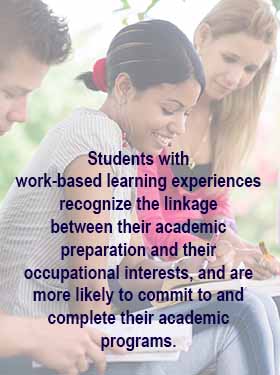Work-based learning (WBL) is a key example of the integration of academic and occupational training that is central to career and technical education. High-quality WBL experiences support students in acquiring the technical, academic, and employability skills through aligned on-the-job learning and academic education (Fuller Hamilton, 2014). There are five types of WBL, that when integrated into career and technical education programs have been shown to have notable benefits for students, especially for students from underserved racial, ethnic, and socioeconomic backgrounds. They types include: apprenticeships, clinical placements, internships, school-based enterprises, and service learning or community-based learning.
There are numerous benefits associated with quality WBL experiences, including increases in students’ persistence, graduation, and employment rates (Holzer & Lerman, 2014; Kuh, 2008; Lerman, 2010; National Survey of Student Engagement, 2007). WBL experiences also expose students to authentic work environments and settings and reinforce the relevancy of their academic learning (Lerman, 2010). Further, these experiences heighten students’ career awareness and provide opportunities for career exploration (Linked Learning Alliance, 2012).
WBL is a critical component of the applied and engaged learning central to quality career and technical education programs. OCCRL’s newest Pathways to Results Insights on Equity and Outcomes brief, "Work-Based Learning as a Pathway to Postsecondary and Career Success," provides readers with a broad definition of WBL in postsecondary education setting, the benefits of WBL, and key elements for implementing high-impact, high-quality WBL programs.
References
- Fuller Hamilton, A. N. (2015). Work-based learning programs: Providing experiential learning opportunities for all students. Champaign, IL: Office of Community College Research and Leadership, University of Illinois at Urbana-Champaign.
- Holzer, H. J., & Lerman, R. (2014). Work-based learning to expand jobs and occupational qualifications for youth. Challenge, 57(4), 18-31. doi: 0.2753/0577-5132570402
- Kuh, G. D. (2008). High-impact educational practices: What they are, who has access to them, and why they matter. Washington, DC: Association of American Colleges and Universities.
- Lerman, R. I. (2010). Expanding apprenticeship: A way to enhance skills and careers. Washington DC: Urban Institute.
- National Survey of Student Engagement. (2007). Experiences that matter: Enhancing student learning and success. Bloomington, IN: Center for Postsecondary Research, School of Education, Indiana University.
